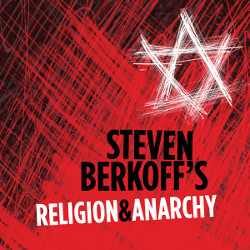Religion and Anarchy

Four yellow stars at least for Steven Berkoff. There’s no one like him in our theatre, and his quirky, visceral, impassioned Cockney Jewish playwriting, so endemic to the plasticity of his acting, deposits him squarely outside the usual groupings of his peers and contemporaries.
Berkoff was “in yer face” years before that ugly term was coined. He was “up yer nose,” too, and “down yer trousers.” His evening of short recent plays, directed by himself and Max Barton, contains a catalogue of Anti-Semitism, a litany of noshing highlights, from chicken soup to latkes and borscht, and a couple of holocaust sketches.
In How To Train an Anti-Semite, a pair of married bigots in Tottenham sound off against the Jews for stealing “turf” from the Palestinians, recycle the holocaust deniers’ anthem of six million being an exaggerated figure and conclude that a Hitler-style “spring clean” wouldn’t be a bad idea with all these Asians, blacks, Latvians, Poles and Cypriots knocking around.
To say that Clive Mendus and Gillian Wright (she’s best known for playing Jean Slater in EastEnders) perform this with great energy and brio is not to endorse what they are saying; these characters are verminous scum, and very funny, too.
Designer Cherry Truluck supplies pictures of a bulldog and the royal family on the walls; these are replaced in Guilt with Golda Meir and some mouth-watering edibles as the same two actors (now playing Jewish) discuss the sensual memory of kosher nosh and lament the passing of a restaurant.
But there’s an aching chasm in their lives, too, the loss of a son who’s either estranged, missing, or somehow gone “wrong”; he haunts their litanies of soup and latkes, herring and cream cheese, which have come to represent the signal meaning of their lives. Guilt is strangely moving, the shadowy son a ghost at his own parents’ feast.
In the second half, the mother in Roast tells her daughter (Lucy Hollis) the bed-time horror story of a small boy, just like her, inducted into Christianity and feeding on the body and blood of Christ in the sacrament of the Eucharist and the wine. And then Anthony Barclay and Tom Lincoln play prisoners in an internment camp – one was a watchmaker, one a dentist – marching towards their grim fate.
Finally, Gas is a gas of a tableau for three writhing death camp victims, fading with love in their hearts for each other. It’s as though the monstrosity of the crimes committed against Jews somehow made them more theatrically viable and interesting. I can’t even begin to wrestle with that idea, but I do find Gas, and indeed the other plays on this contentious bill of fare, more disturbing than either Martin Sherman’s Bent or Caryl Churchill’s Seven Jewish Children.










